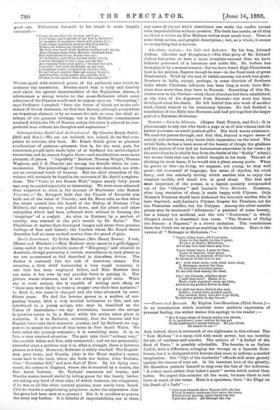Sam's Sweetheart. By Helen Mathers (Mrs. Henry Reeve). 3 vols.
(Horst and Blackett.)—Miss Mathers' story opens in a gold-diggers' camp, called by the probable name of "Misogamy," and situated in Australia, though possessing a certain resemblance to such places as we are accustomed to find described in American fiction. The dialect is curiously like the talk of American camps. The situation, a little child humanising a very rough company, is one that has been employed beforo, and Miss Mathers does not make it her own by any peculiar force in patting it. Her picture wants clearness, and is not always in good taste. When she is moat serious, she is capable of writing such slang as " these men were likely to come a cropper over their best instincts." In Book ii., the scene is changed and the time advanced by some fifteen years. We find the heroine grown to a maiden of sur- passing beauty, with a very decided inclination to flirt, and are introduced to a young savage, who may be described as the Uncas of Australasia,—we say Australasia, because the savage in question seems to be a Maori, while the action takes place in Australia. It is to Bathurst, certainly, that the heroine and her English lover take their romantic journey, and by Bathurst we sup- pose to be meant the place of that name in New South Wales. We have called the journey romantic ; it is something more. It is, in fact, a very strained situation. The pair take their "solitary way," like another Adam and Eve, only unmarried ; and we are perpetually reminded what a perilous way it is, what a struggle there is between passion and duty. However, Bathurst is safely reached. The English- man goes home, and Wantha (that is the Maori maiden's name) turns back to the bush, where she finds her father, John Trefusis, alias " Cucumber Bill," and now Earl of Thor. By his dying com- mand, she comes to England, where she is received by a cousin, the Rev. Amos Trefusis. Mr. Trefusis' resources are scanty, and Wantha makes herself useful by killing game for the family larder, not taking any heed of close-time, of which, however, the clergyman, if he was at all like other country parsons, must surely have heard. (Yet he thanks a neighbouring proprietor, under the impression that the game had been sent as a present.) But it is needless to pursue the story any further. It is brimful of improbabilities, nor is there any trace of the art which sometimes can make the reader accept even improbabilities without question. The book has merits, as all that so clever a writer as Miss Mathers writes must need's have. There is some brisk action, and graphic description; but, as a whole, it seems to us anything but a success.


































 Previous page
Previous page